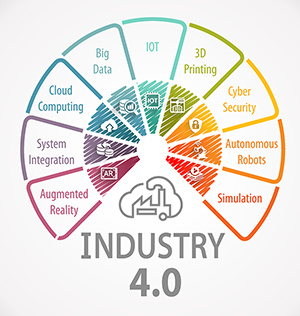Leveraging Industry 4.0 in the Paper Industry
In the past, managing the dryer section of a paper machine for high performance required operators to be dryer section, steam, and control system experts. With the Dryer Management System® (DMS) control system, all steam system set points can be automatically and continuously adjusted to create a stable and efficient dryer section operation. Communication between the various control loops allow the dryer section to operate with improved energy efficiency, with fewer sheet breaks, and with a wider range of control. This innovation was the beginning of Kadant’s emergence into the fourth industrial revolution more than a decade ago.
 The DMS control software is designed around four modules; Supervisory Control, Remote Interface, Energy Management, and Valve Conditioning Monitoring, all of which demonstrate Industry 4.0 technologies.
The DMS control software is designed around four modules; Supervisory Control, Remote Interface, Energy Management, and Valve Conditioning Monitoring, all of which demonstrate Industry 4.0 technologies.
The Supervisory Control Module is the heart of DMS technology. The system receives information on the operating conditions (grade, speed, moisture, etc.) and computes the information to meet the current drying requirement to keep the steam system in balance and maintain the MD moisture profile. In some cases, trouble spots are diagnosed and resolved so quickly that machine operators see no indication of any issue. For example, at a UK paper mill using the DMS Supervisory Control module, a loss of vacuum in the wet end was identified and compensated for within the dryer section to such an extent that there was no outward indication of a problem. This is an example of technologies that fall under Cognitive Computing in Industry 4.0. The DMS control technology is analyzing data and executing best practices to ensure correct operating conditions to enhance productivity.
The Remote Interface Module provides an operator interface station at the reel panel to control the entire steam system. Kadant engineers remotely dial into the system to carry out a health check and offer process optimization advice as needed. This link is useful for troubleshooting. These capabilities are defined under the Internet of Things in Industry 4.0 due to the connectivity of the system and the efficiency of remote dial-in by engineers. This eliminates physical maintenance and decreases the risk of major engineering faults.
The DMS control system has demonstrated the advancement of Industry 4.0 within the paper manufacturing sector and benefits that will be achieved as more technology is developed using these techniques. The final article in this series will provide a more in-depth look into the DMS control system within a paper mill.